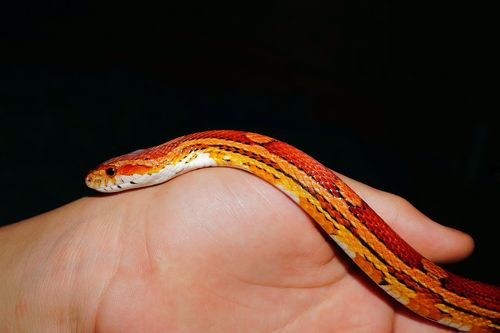Breed Introduction
Corn Snakes are ground-dwelling reptiles adapted to pine forests, grasslands, and farmlands. Known scientifically as Pantherophis guttatus, they are distinguished by their robust build and vibrant colors. These snakes grow by shedding their skin, an interesting aspect of their biology.
- Class: Reptilia
- Domain: Eukaryota
- Family: Colubridae
- Genus: Pantherophis
- Kingdom: Animalia
- Length: Adult Corn Snakes typically measure 80-120 cm, with the longest reaching up to 182 cm.
- Weight: Adults generally weigh around 500-800 grams.
- Color: They come in various colors, including gray, tan, yellow, and orange, with red or reddish-brown blotches edged in black. Their bellies have alternating checkerboard patterns.
- Behavior: Known for their docile nature and ease of handling, they rarely bite even when startled, making them perfect for beginners.
Corn Snakes are carnivores, primarily eating small mammals like mice and birds. In captivity, they are usually fed thawed frozen mice. Ensure the food size is appropriate to prevent digestive issues. Young snakes should be fed pinky mice, gradually increasing in size.
- Natural Habitat: Native to the pine forests, grasslands, and farmlands of North America, they adapt to a variety of environments.
- Enclosure: Typically, a 30 to 40-gallon tank is sufficient, with a substrate like coconut fiber or newspaper to mimic their natural environment. The tank should have a secure lid to prevent escape. Include items like driftwood, artificial grass, hiding spots, and a water bowl.
- Lighting: Requires 12 hours of light daily using a low-wattage UVA/UVB light source.
- Temperature: Maintain an ambient temperature of 82-88°F (28-31°C), with a basking spot of 90-95°F (32-35°C). Avoid feeding if the temperature drops below 79°F (26°C), as it slows digestion.
- Additional Needs: Provide a heat lamp, under-tank heater, and regularly clean the enclosure to ensure a healthy living environment.
- Shedding: Frequent shedding, especially in young snakes. Proper humidity and hydration are crucial during shedding periods.
- Health Concerns: Generally healthy, but a varied diet is essential to avoid nutritional deficiencies.
Owning a Corn Snake is a rewarding experience due to their unique characteristics and manageable care requirements. Here are some quick tips:
- Varied Diet: Ensure they receive all necessary nutrients.
- Proper Enclosure: Adequate space and the correct substrate prevent stress and health issues.
- Regular Interaction: Helps tame your snake and reinforces its docile nature.
- Temperature Monitoring: Crucial for their health and well-being, especially during shedding.
- Avoid Co-habitation: Corn Snakes are typically solitary and may become aggressive if housed together.

